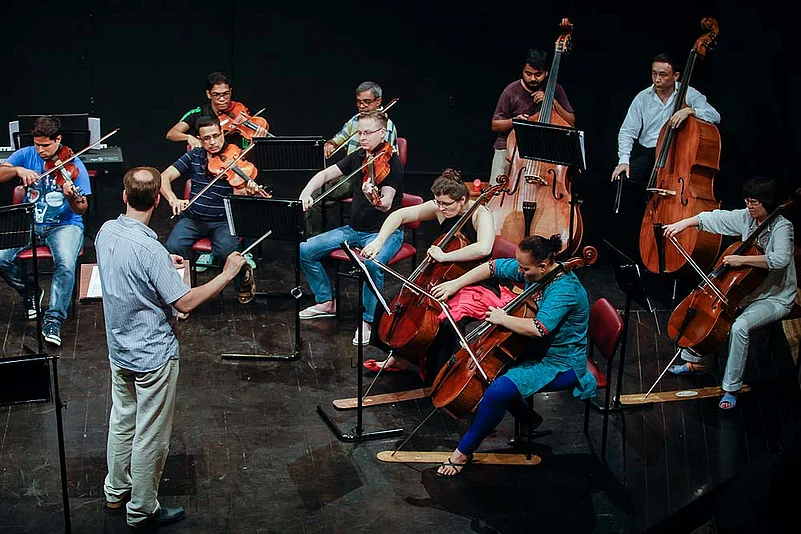Reaching Out...
- Kala Ghoda Festival (South Mumbai) The Symphony Orchestra of India (SOI) performed at this fest earlier this year
- Juhu (a western suburb of Mumbai) The SOI performs a monthly series of concerts at the Prithvi Theatre
- Vashi NCPA collaborates with the Shankar Mahadevan Academy (SMA)
- Kolhapur, Jalgaon, Nashik NCPA organised concerts by Kaushiki Chakrabarty, a leading young vocalist, in these towns
***
It’s a rainy evening, but in the lanterned glow of the cafe at the iconic Prithvi Theatre, there’s a buzzing warmth. Stage actors, directors, writers mingle among themselves and with theatre enthusiasts, all familiars. About 7.30 pm, they begin to drift towards the 200-seat hall, aiming to settle into the best seats. Only this time, the best seats are well away from the stage. It isn’t a play they’ve come to watch. They are at the cozy theatre in Juhu for a performance by the Symphonic Orchestra of India, an event usually hosted at the marble-foyered Jamshed Bhabha Hall at the sprawling National Centre for Performing Arts (NCPA) complex in Nariman Point. The very identity of the orchestra is bound to the NCPA’s, and indeed, far more unusual than Prithvi Theatre hosting a musical event is the fact of NCPA stepping out of its magnificent theatres and grand auditoriums, laid out among lawns in a dazzling corner of south Mumbai.
For over a year now, the NCPA has been working at an image change for an institution that chairman K.N. Suntook says was described as “snooty” and “resembling a morgue”. Playing down the associations that have grown around the NCPA, he says, “This place was built to promote culture in all its forms—western and local.” The NCPA has even joined hands with the Shankar Mahadevan Academy, an online music school run by the popular Mumbai-based singer-musician. It has also collaborated with fan circles in towns like Kolhapur and Nasik to curate events by the best vocalists and instrumentalists. “Slowly,” Suntook says, “we are spreading our wings.”
Whether it is western or Indian music, classical, popular or folk, the NCPA team has always laid emphasis on quality, says Dr Suvarnalata Rao, research scientist and head of programming (Indian music) at NCPA. Equally, she says, the emphasis now is on reaching out. “We always knew we wanted both—to bring artistes to our venues and go out,” she says. “Because we had the venues, bringing artistes here was cheaper. Now, with some additional resources, we are able to go out more.”
Performances have been organised in Delhi, Chennai and Bangalore, but—as in other spheres such as marketing and the education business—rich pockets of possibility are being found in the smaller towns. As also in the suburbs of Mumbai, so far beyond the NCPA’s influence. Attempts are also being made to draw young people to the NCPA, with guided tours and other activities. “We want to let them hang out here, so that they will develop some attachment,” says Suntook.
Of the Prithvi experiment, Kunal Kapoor, of the Kapoor family of Bollywood, who looks after small theatre, says, “Although we are different, and our sensitivities are different, it has been great to work together.” Kapoor often welcomes audiences at the Prithvi, standing in the aisles, in sharp contrast to the formality at the NCPA. Says he, “Initially, one of the conductors told me he felt as if he was performing naked—for that’s how close and intimate the audience at Prithvi gets. But afterwards, even the musicians said it was a joy to perform here and see repeat audiences!”

Audiences too have been enthusiastic. “It’s definitely convenient to watch a concert here because I stay in Andheri,” says Vivek Tondon, an actor who had come to watch pianist Karl Lutchmayer perform at Prithvi. In his introduction, the witty Lutchmayer too made mention of the quick autorickshaw ride from Bandra that brought him to Juhu as opposed to the long cab drive that he’d have had to take to reach the NCPA.
Piotr Borkowski, resident conductor of the Symphony Orchestra of India, is now familiar with the distances and spaces of the city, thanks to performances in the suburbs. He says that in his native Poland, you could cover 100 km in the time it took to reach NCPA from the suburbs during peak hours. “Now we have a better understanding of the spaces such as Prithvi and we play accordingly, keeping the reverberation in mind,” he says. “We performed in Pune too, and the audience was great.”
But there’s another side. “They have expanded their portfolio and become more dynamic of late,” says actor-director Lilette Dubey, “but we are suffering because our space has reduced massively. Producers are multiplying, but there is a dearth of venues. The city needs at least 10 NCPAs and 10 Prithvis. We need venues for dance, for other programmes. And there’s no help from the government.” Theatre rentals are going up and smaller theatre groups—which are growing in number, but running out of performance space—are feeling the pinch.
Funds have been a challenge for every stakeholder in the performing arts. Although the NCPA received the land for free from the government and the Tatas reclaimed land from the sea—the well-known Backbay reclamations—to lay out the NCPA complex, the institution itself has been struggling for funds. Tickets have to be kept in a certain price range to attract a sizeable audience; grants from the government are not proving enough. Some help has come from corporate social responsibility (CSR) initiatives.
Hopes were raised when the NCPA auctioned the bungalow of Dr Homi Bhabha, which was bequeathed to the institution, and Rs 372 crore was raised through a successful bid by the Godrej family. However, a legal case followed. Employees of the department of atomic energy (dae), which Bhabha had helped found, urged the court and the government to declared the bungalow a heritage site. Recently, the charity commissioner has allowed the sale to be completed. It is unclear when these funds will become available to the NCPA.
But there is little doubt about Brand NCPA. “As an organisation, it is associated with class and high standards. So other cities, other organisations would be more than willing to collaborate,” says singer Mahadevan, whose music school has partnered with NCPA. “There is an audience for NCPA as an entity, not just the venue. Our aim is to propagate. To do a good job of transition will be a challenge. One must have the capacity to overcome challenges, which the NCPA has.”
Doubts about that begin to melt away, at least temporarily, when Piotr breaks into a dramatic flourish while conducting Bach at the Prithvi—and the audience, more accustomed perhaps to instant daads and wahs at Indian concerts—holds itself back from launching into an applause right away. And after the music has faded, it gives the musicians a standing ovation.
By Prachi Pinglay-Plumber in Mumbai


























